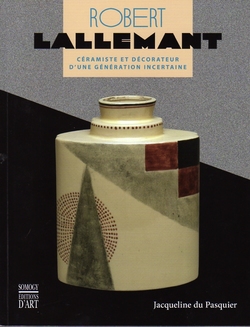
This is the first extended study of the work of the revolutionary French Art Deco ceramicist Robert Lallemant (1902-1954), who flourished in Paris between 1925 and 1933 before mostly abandoning ceramics for furniture design, interior decorating, architecture, travel and photography. Lallemant has been somewhat overlooked by French art history, partly because he was a successful artist-businessman, and partly also because of the brevity of his career, the originality of his designs, and his friendship with Maréchal Philippe Pétain, ‘Head of State’ of the collaborationist Vichy government during the Second World War. Du Pasquier, who has published numerous books on French art ceramics and glassware, particularly those of the Bordeaux region, devotes almost a third of the book to Lallemant’s two years – 1943-44 – as “Special adviser to the civil office of the Head of the State” or “Artistic Advisor to the Maréchal” – ostensibly to show the non-political nature of his devotion to the aging general.
Lallemant’s sister-in-law, Aline Montcocol, was the wife of Pétain’s close friend and personal physician, Bernard Ménétrel, who became his chief of staff during the Vichy period. After the war Pétain was convicted of treason, sentenced to death, and died in prison in 1951, age 95, having had his sentence commuted. Ménétrel was also tried but released in disgrace with the case against him declared unproven, and died shortly after in an automobile crash. His widow subsequently became president of a controversial ultra-nationalist association ("L'Association pour défendre la mémoire du maréchal Pétain" or "ADMP") founded to rehabilitate Pétain’s memory. Lallemant himself, who had joined the French navy when war was declared, had moved his wife and children to the relative security of
 RSS Feed
RSS Feed